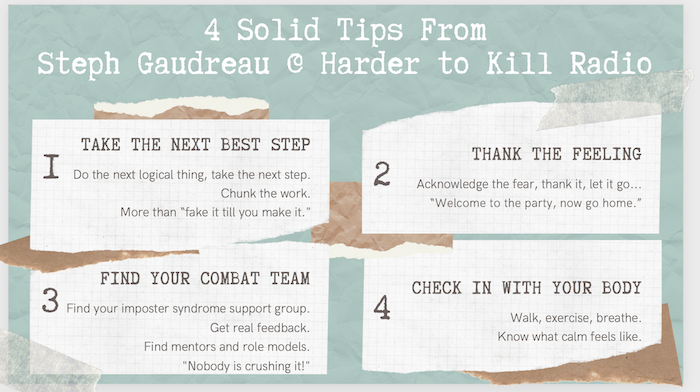Maybe you started a new job or just got a promotion, and you’re questioning if you’re qualified. Or maybe you were asked to take on an assignment and feel woefully inadequate.
Where does this unwarranted sense of insecurity come from? And how do you combat those feelings of fraudulence? This was the topic of discussion at GovLoop’s recent GovUp, “How to Deal With Imposter Syndrome.”
Nearly 70% of the U.S. population experiences imposter syndrome and that energy can either fuel you or cripple you. “This is something that we all go through,” said GovUp guest speaker Wendie Veloz, Founder & Chief Wellness Motivator at Wellness Grind. Below we’ve highlighted some helpful insights and tips from her presentation.
So what is imposter syndrome?
Imposter syndrome is an overwhelming feeling that you don’t deserve your success. You feel like your achievements are due to luck, good timing or just being in the right place at the right time.
Imposter syndrome can happen at any time and in any setting, not just at work or when you have to perform in a professional capacity. It can even happen when doing yoga. “I am an imposter yogi,” Veloz joked.
How do imposter syndrome feelings manifest?
Feelings include anxiety, self-doubt, fear, perfectionism, self-judgment, negative self-talk, over prepping, procrastination, fear of failure, dwelling on past mistakes and self-sabotage.
Imposter syndrome is something that you can overcome using tools and techniques, and it is situational, Veloz said. This differs from mental health, which inhibits your ability to function on a consistent and persistent basis.
What does imposter syndrome look like from a civil servant’s perspective?
As a federal employee, you face challenges that are unique. “We are the face of the taxpayers’ dollars,” Veloz said.
That comes with pressure, priority and power. When you are not sure of yourself, it can be easy to feel like an imposter. “It’s the feeling that you get of being uncomfortable when you are at the edge of your comfort zone,” she added. Here are three key areas where government employees can often feel imposter syndrome:
- Playing the expert. The public looks to you as an authority, expert and representative of the federal government’s perspective on important issues. But, remember, “It’s OK, even when you are being the expert, to be wrong, as long as you are being humble about it and you finally get to the correct answer,” Veloz said.
- In government verses out of the government. You may be the expert in the government, but do you carry that expertise with you outside your federal job? For example, perhaps you are in a public health role at work but feel hesitant to speak on health-related issues outside of work. The key is knowing your role, what you were hired to do and where that power starts and ends.
- Your seat at the adult table. When you are around people who have a significant amount of expertise and years in government, you can feel like you are playing big kid at the adult table. To combat this, “show up,” Veloz said. Put on your game face, and do not sit quietly because you are the new person. You have the talent and experience that people need to hear.
How do you combat imposter syndrome?
The key is interrupting your normal response cycle. Let’s say your boss asked you to give a presentation. You think you don’t know the topic, and you get anxious. Your stomach starts to hurt, and your normal response is to tell your boss that you can’t give the speech.
When this happens repeatedly, you use your past experience to determine what you are going to do next, Veloz said. “Over time, your altered response is to become fearful and say ‘no.’”
That’s why you have to be self-aware to do the work and interrupt that behavior. “This interruption part is the hardest part,” she said. “Your actions need to be maintained over time as an interruption cycle.”
When the stimuli come in, interrupt that negative thought by telling yourself that you are capable. Tell your boss you will volunteer for the opportunity. If you’re in a meeting and imposter syndrome creeps in, write down an encouraging word or note for yourself as a reminder that you can do it and you are capable.
But the step many people neglect is to reward yourself for taking that action. “There are healthy ways to reward yourself,” Veloz said. You might not get the acknowledgment or pat on the back at the all-hands meeting, so you need to reward yourself to encourage more positive interruptions.
Putting your plan into action
Combating imposter syndrome is not a one-time event. Veloz offered these tips to help you walk in confidence and not let imposter syndrome get the best of you:
Question yourself and establish what is fact versus fiction. Ask yourself: Why am I feeling this way? What are feelings versus facts?
Meditate and take deep breaths. Learn to meditate and breathe to foster long-term change and immediate interruption. Take notice of the fact that you are breathing. Mindful.org has some great resources on this topic.
Change how you think and feel by interrupting negative thoughts. Consider this question: “What way do I want to be right now?” Practice being who you want to be.
“Each of you has your own wellness recipe,” Veloz said. The key is finding that recipe and using it.






This is so helpful. Thanks for addressing this important, yet overlooked topic!
[…] dialect challenges are reinforced by imposter syndrome, Agramonte said, which is a feeling of being unqualified for one’s position. For […]